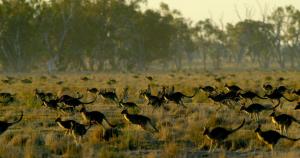Uhunt
Can the Kangaroo Industry be saved?
Uhunt Mag Information
- Posted By : UHUNT APP - Jesse Farr
- Posted On : Jan 22, 2020
- Views : 6627
- Likes : 8
- Category : NEWS
- Description : mass culling of Kangaroos in the region has devastated the harvesting industry
Overview

Can the Kangaroo Industry be saved?
A co-op group in the Maranoa region in Queensland is attempting to introduce a 10c per kilo price to farmers for Kangaroo that is harvested on their property. In exchange, the farmer must not apply for or use a damage mitigation permit or allow recreation shooters to engage in mitigation culling.
The mass culling of Kangaroos in the region has devastated the harvesting industry which use to directly employ or supplement the incomes of hundreds of working people in the region. When the industry was running at its highest capacity it supported upwards of 5000 people nationally and brought millions of dollars into rural communities. These people spent their money in the local towns and helped keep shops in business. It's estimated that currently, the box in Mitchell contributes more than $300,000 a year to the town.
We've been saying to shooters and companies for years that if we can't give back to the farmers our harvesting and hunting opportunities are going to disappear sooner or later. The Maraona region is the best example of this, with the widespread use of exclusion fences and extensive culling programs; Kangaroo populations are at the lowest level they have ever been. We believe the 10c rate needs to be introduced Australia wide and the government needs to get behind the industry with grants and cut red tape. It's not only the 10 cents a kilo though, Farmers need to consider the money they get back through their workers. When a farmhand can subsidize his income by harvesting Kangaroos it reduces pressure on primary producers to pay higher wages.
The Kangaroo is a unique animal only available in Australia, unlike beef and pork which is available everywhere in the world. For the last 3 decades, we have let greenie groups run the industry into the ground and devalue our true blue meat. Essentially, many countries are convinced it's inhumane and won't purchase, or are not allowed to purchase due to poorly negotiated trade deals. The meat is now considered low value and they don't want to pay good money for it; this needs to change. If harvesters, farmers and processors can work together we could promote the meat in a better light and lift it to a premium status international. The value of Kangaroo meat needs to be high enough to be viable for all involved, this benefits not only the people in the industry but also greatly increases the welfare and sustainability of Kangaroo populations. They are native and are well adapted to the countries dry conditions, we believe in 10 years Kangaroo meat might be worth more than sheep and cattle, at least from a cost of production perspective.
J. Farr says "I've always found it ridiculous that we shoot Kangaroos and leave them to rot just to introduce species that need constant human support to survive in this country. It's crazy if you really think about it, the Kangaroo reproduces that fast that even in tough times we struggle to control their numbers. If we can convince the world Kangaroo is worth a decent price it could completely change how farmers manage their properties, especially in western regions."
Some believe recreation hunters need to heed this warning as well, if we can't bring value to Deer and Pigs for farmers the days of hunting them will end, sooner rather than later. Methods of culling are becoming more effective and farmers want to reduce costs any way they can. Deer and pigs compete with stock for food and cost the farmers money; it's only natural they want to get rid of them. Hunting is a lifestyle but also brings over 2 billion dollars into the economy, recreational hunting is worth more than money though. It's very important to the mental welfare of our rural communities, people that hunt are happier and healthier and It keeps them in the bush. Employment opportunities and outdoor activities are decreasing rapidly in this country, we need to start turning that around.
